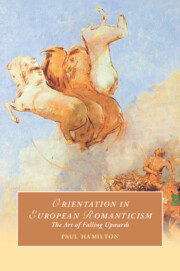Book contents
- Orientation in European Romanticism
- Cambridge Studies in Romanticism
- Series page
- Orientation in European Romanticism
- Copyright page
- Contents
- Acknowledgements
- Part I Disorientating Kant
- Chapter 1 Introduction
- Chapter 2 Kleist and the Kant-Crisis
- Chapter 3 Hölderlin and the Philosophers
- Part II The Uses of Abjection
- Part III Optimism and Pessimism
- Part IV Romancing the Modern
- Notes
- Bibliography
- Index
- Cambridge Studies in Romanticism
Chapter 3 - Hölderlin and the Philosophers
from Part I - Disorientating Kant
Published online by Cambridge University Press: 13 October 2022
- Orientation in European Romanticism
- Cambridge Studies in Romanticism
- Series page
- Orientation in European Romanticism
- Copyright page
- Contents
- Acknowledgements
- Part I Disorientating Kant
- Chapter 1 Introduction
- Chapter 2 Kleist and the Kant-Crisis
- Chapter 3 Hölderlin and the Philosophers
- Part II The Uses of Abjection
- Part III Optimism and Pessimism
- Part IV Romancing the Modern
- Notes
- Bibliography
- Index
- Cambridge Studies in Romanticism
Summary
This book revives a contested moment in the history of aesthetic theory when Romantic-period writers exploit the growing awareness of irresolutions in Kant’s third Kritik, especially in his critique of judgements of the sublime. Read with hindsight, these openings can be seen to have generated literary opportunities for writings that explicitly embraced the philosophical significance delegated to the aesthetic by Kant, but then took advantage of the licence he had conceded. Romantic writing claimed a wider significance of its own that philosophy now had to learn to rationalise. Consequent aesthetic reorientations, in which splendours and miseries become interchangeable, reflect political instabilities already exploited by feminist and nationalist writing. Falling becomes a kind of rising, and literature’s unregulated power of metamorphosis persuasively challenges hierarchies of all kinds, including its own.
- Type
- Chapter
- Information
- Orientation in European RomanticismThe Art of Falling Upwards, pp. 42 - 84Publisher: Cambridge University PressPrint publication year: 2022

